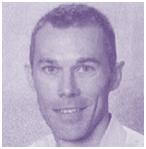Contributor Spotlight: Jason Zeitler
 Jason Zeitler’s piece “Remembrance” appears in Midwestern Gothic‘s Winter 2018 issue, available now.
Jason Zeitler’s piece “Remembrance” appears in Midwestern Gothic‘s Winter 2018 issue, available now.
What’s your connection to the Midwest, and how has the region influenced your writing?
I was born and raised in South Dakota. I’ve actually lived in other parts of the U.S. for longer than I lived in South Dakota, but I still consider myself a Midwesterner. If nothing else, I’ve retained the sensibilities and speech patterns of someone from the Midwest, and I think those things have bled into the content and rhythms of my writing. This is true even when the narratives themselves are set in places outside the Midwest.
What do you think is the most compelling aspect of the Midwest?
The most compelling aspect is its expansiveness and the possibilities that implies. Take the Dakota plains, for example. The landscape itself is on such a grand scale. You look out and see endless grass or endless snow or endless sky. That expansiveness and freedom invariably affects your world view.
How do your experiences or memories of specific places—such as where you grew up, or a place you’ve visited that you can’t get out of your head—play a role in your writing?
Even in my fictional pieces, I find details about growing up in the Midwest creeping into the narrative: dogs I had as a child, hunting trips in South Dakota, teenage obsessions, etc. You can’t escape who you are or the experiences that formed you.
Discuss your writing process — inspirations, ideal environments, how you deal with writer’s block.
I write when something takes ahold of me. Writing is nine parts hard work and one part inspiration, but the process starts with inspiration. More often than not your writing is mediocre when your heart isn’t in it. The kinds of things that inspire me are usually dramatic experiences or images I can’t get out of my head, and in that sense the writing process amounts to an exorcism.
My ideal writing environment is at home with no distractions. When I get writer’s block, I do one of two things: (1) write through it, even if the result isn’t worth the paper it was written on, and then whittle away until I get what I’m looking for; or (2) put the writing aside and focus on something else until inspiration returns (which may mean simply going for a hike or a swim to clear my head, or it may mean not writing for an extended period).
How can you tell when a piece of writing is finished?
I know I’m finished with a piece when I start fretting over the placement of commas and/or when I start reciting whole sections of text in my head for the pure pleasure of it. Usually shortly after one or both of these things happen, I stop thinking about the piece and feel inclined to move on to something else.
Who is your favorite author (fiction writer or poet), and what draws you to their work?
I like so many different writers, it’s hard to identify a favorite. In my late teens and early twenties, I was obsessed with Dostoevsky. At about that same time, I developed a fondness for the modernists and the anti-modernists—Faulkner and Woolf and Orwell and Steinbeck, respectively—because of what they taught me about fictional technique. More recently, I’ve found myself drawn to writers like Cormac McCarthy and William Gay and Michael Ondaatje because of their dark lyricism.
What’s next for you?
This is something I’ve thought about a lot lately, and I’ve come to the conclusion that continuing to write short stories and narrative essays is enough for me. Of course I want an audience and validation from writers and editors, but fame and fortune aren’t at the top of my list of goals for myself. If I ever run out of ideas for shorter pieces, I might try my hand at a novel, but for now, the only substantive goal I have with my writing is to get a collection of stories published, which would be a truly gratifying culmination to my work over the past several years.
Where can we find more information about you?
I live and write in obscurity, and I’d like to keep it that way. I suppose it’s ironic for me to say something like that and at the same time to publish personal essays (and to participate in this interview, for that matter). But there’s a reason why I don’t have social-media accounts or a cellphone: I value my privacy. In a similar vein, I want the stories I get published to be about the writing, not about me, even when, ironically, I happen to be the narrator.






